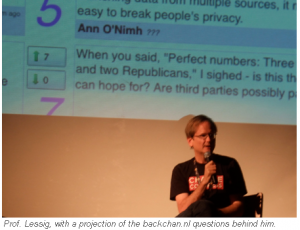Tools/backchan.nl: Difference between revisions
mNo edit summary |
mNo edit summary |
||
| Line 1: | Line 1: | ||
{{ToolInfo | {{ToolInfo | ||
|title=backchan.nl - listen to the | |title=backchan.nl - listen to the what the class are saying | ||
|tagline=Get feedback and involve the audience | |tagline=Get feedback and involve the audience | ||
|image=backchannel.png | |image=backchannel.png | ||
|description= “backchan.nl” offers a way let the audience of {{tag|presentations}} ask {{tag|questions}}. They | |description= The back-channel is a term to describe what the class might be saying or thinking during a lesson. “backchan.nl” offers a way let the audience of {{tag|presentations}} comment or ask {{tag|questions}}. They could also be {{tag|voting}} on the importance each other's questions - which is a great opportunity if you've ever wished a question and answer session to end. The voting then allows the presenter to prioritise questions that merit answering. As well as know what is going on in the 'back channel', this tool is claimed to make better use of that Q & A time. You might use it while showing a video, or dare to use it while talking at length to the class. But here you also have a means to encourage pupils to actually ask questions, and furthermore, have them think about each other's questions. | ||
|strategy= | |strategy= | ||
|ideas= | |ideas= | ||
Revision as of 23:42, 6 September 2012
Tool Description The back-channel is a term to describe what the class might be saying or thinking during a lesson. “backchan.nl” offers a way let the audience of presentations(ta) comment or ask questions(ta)/polls(tool). They could also be voting(tool) on the importance each other's questions - which is a great opportunity if you've ever wished a question and answer session to end. The voting then allows the presenter to prioritise questions that merit answering. As well as know what is going on in the 'back channel', this tool is claimed to make better use of that Q & A time. You might use it while showing a video, or dare to use it while talking at length to the class. But here you also have a means to encourage pupils to actually ask questions, and furthermore, have them think about each other's questions. (edit)The back-channel is a term to describe what the class might be saying or thinking during a lesson. “backchan.nl” offers a way let the audience of presentations(i) comment or ask questions(i). They could also be voting(i) on the importance each other's questions - which is a great opportunity if you've ever wished a question and answer session to end. The voting then allows the presenter to prioritise questions that merit answering. As well as know what is going on in the 'back channel', this tool is claimed to make better use of that Q & A time. You might use it while showing a video, or dare to use it while talking at length to the class. But here you also have a means to encourage pupils to actually ask questions, and furthermore, have them think about each other's questions.
Teaching Approach. A way to facilitate checking the students' response (known as traffic lighting) as well as peer assessment(ta)/questioning(ta) during presentation sessions, either by the teacher or students. (edit)
| Tool details | |
| Title | backchan.nl - listen to the what the class are saying |
| Topic | [[Topics/Voting|Voting]], [[Topics/Poll|Poll]], [[Topics/Questionnaire|Questionnaire]] |
| Licence / Cost / Platform | This web tool is an Open Source(i) project at MIT. |
| Subject / Categories | Voting, ToolInfo, Questionnaire, Poll |
| Teaching Ideas / Links | |
| Link | |

